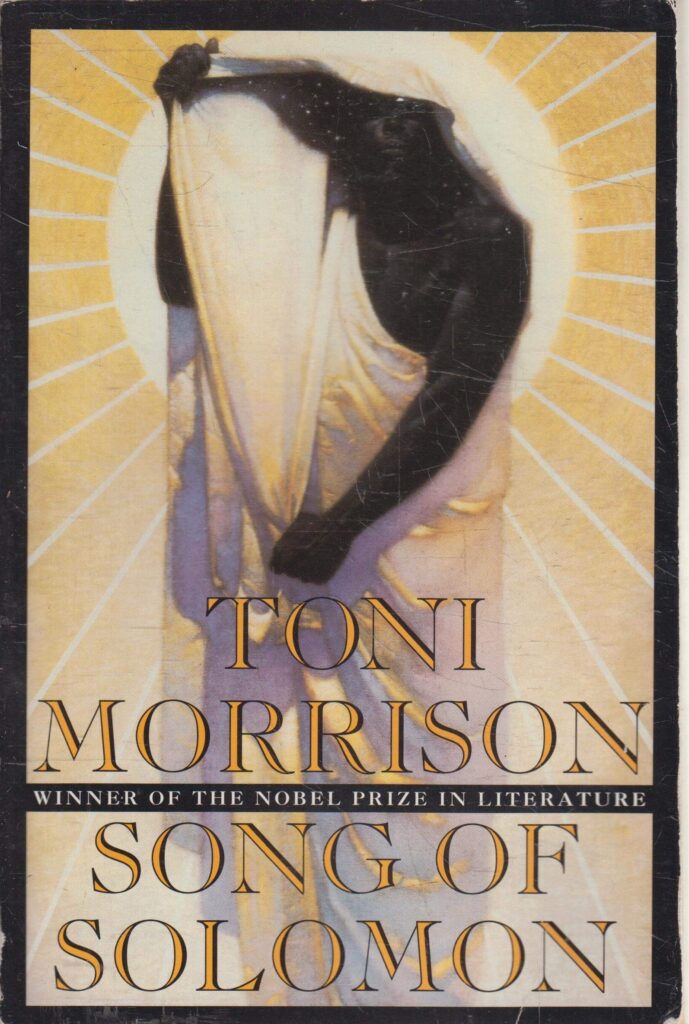Monday – Eid al-Fitr
Muslims celebrate Islam’s feast of Eid al-Fitr today (some celebrated it yesterday), and my Pakistani student—who has been Ramadan fasting since April 1–found that his religious observance gave him special insight into Toni Morrison’s Song of Solomon. In his essay Hamza found something familiar in the protagonist’s search to connect with a rich family lore.
In the novel, Milkman is a selfish and self-absorbed young man who begins finding meaning in his life when the journey he’s taking unexpectedly becomes a roots quest. He discovers that his great grandfather was (so local legend has it) one of the “flying slaves” who flew back to Africa, and other parts of Milkman’s past become clear to him as well. Suddenly, knowledge of family history becomes more important than material things. Hamza noted that Morrison employs magical realism to capture Milkman’s breakthrough, with a limp that he has had all his life suddenly disappearing. As a result of his journey, he finds himself grounded as he has never been before:
[H]e found himself exhilarated by simply walking the earth. Walking it like he belonged on it; like his legs were stalks, tree trunks, a part of his body that extended down down down into the rock and soil, and were comfortable there—on the earth and on the place where he walked. And he did not limp.
By the end, there’s even a (magical realist) possibility that Milkman can fly. Here’s the final paragraph, which describes Milkman facing up to his BFF-turned-enemy, who is about to kill him:
Milkman stopped waving and narrowed his eyes. He could just make out Guitar’s head and shoulders in the dark. “You want my life?” Milkman was not shouting now. “You need it? Here.” Without wiping away the tears, taking a deep breath, or even bending his knees—he leaped. As fleet and bright as a lodestar he wheeled toward Guitar and it did not matter which one of them would give up his ghost in the killing arms of his brother. For now he knew what Shalimar knew: If you surrendered to the air, you could ride it
By the end of the novel, Hamza writes, Milkman reconnecting with his family history and his culture “helps him find a sense of spirituality”:
To explain what is meant by Milkman being spiritually charged, we can compare Milkman’s realizations to the religious practice of fasting during Ramadan for Muslims. In Ramadan, Muslims do not eat or drink from sunrise to sunset. This on the surface may seem like a simple fast but in actuality has a deeper spiritual meaning to Muslims as it allows them to see one another as humans who face the same struggles as themselves. For example, rich and wealthy Muslims experience the same hunger and thirst as poor Muslims, which sparks a sense of humbleness in them. Milkman’s journey to learn about his family sparks the same types of realizations, as his experience during the hunt makes him understand that he has taken his privilege for granted. Learning about his family allows him to see his parents as humans who are not perfect and a product of unfavorable circumstances. These realizations and experiences thus are very transformative for Milkman and result in cultural and spiritual enrichment, very similar to how the month of Ramadan spiritually enriches Muslims.
Hamza concludes:
Milkman has come a long way from being a narrow person to someone who is spiritually charged and cares about others. Toni Morrison uses Milkman taking a leap and surrendering himself to the wind as magical realism symbolizing Milkman’s ascension to self-actualization. Having buried his grandfather’s bones and connected with his family ancestors, Milkman’s character has evolved to the point where he has faith in his ability to fly. By the end of this novel, Milkman, through his quest for self-realization, has evolved from a shallow person who limps to a culturally enriched and deeply developed character who can fly.
When we discussed his paper, Hamza added that to have bad thoughts about someone during Ramadan is another way to violate the fast. Worshippers must focus on love and understanding, both of which come to Milkman in the late stages of his own journey. That in turn led us to examine Milkman’s friend Guitar, who has found a different purpose to his life.
Guitar, once a sensitive and admirable man, has become so unhinged by racial injustice that he has taken it upon himself to (as he sees it) right the imbalance: he joins a group that kills an innocent White for every innocent Black who is murdered. Murderous violence takes on a dynamic of its own, however (as Martin Luther King Jr. recognized), and suddenly Guitar isn’t only targeting Whites. Blacks whom Guitar judges to have been overly accommodating to White society are also fair game, and amongst these he includes his former friend.
As I talked with Hamza, I thought of the recent Afghanistan Mosque bombings. A suicide bomber killed 50 Ramadan worshippers in a mosque three days ago and there was another bombing the following day. The violation of a religious observance meant to foster peace, understanding, love, and spiritual connection is comparable to Guitar killing Milkman and his aunt Pilate when they are ritually burying an ancestor’s bones.
In her novel, Morrison sees hate and love vying for supremacy in young Black men and, as her final paragraph notes, she’s not sure “which one of them would give up his ghost in the killing arms of his brother.” But she knows, as Hamza knows, which path brings us closer to spirit. Hate destroys the soul while love puts us in touch with the divine.
If we surrender to the air—if we surrender to the spirit—we can ride it.


